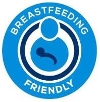Nutrition for Mum and Baby
Information on keeping mum and baby healthy.
Breastfeeding

The National Breast Feeding Strategy is implemented through the local translation of NHS Lothian's Breast Feeding Strategy. In West Lothian the local implementation group oversees the delivery of the strategy by developing a local strategy and action plan.
This involves:
- challenging cultural attitudes;
- ensuring that breastfeeding is supported by policy and practice in NHS and other workplace settings;
- equipping staff with the knowledge and skills to facilitate and support breastfeeding
- developing quality data collection and dissemination systems.
Look out for the Breastfeeding friendly sign. This shows a business or building supports breastfeeding and can offer extra help to ensure you can feed your baby in comfort.
Weaning
The current UK recommendation is to introduce solid foods along with baby's usual milk at 'around 6 months'
Your baby may be ready for 'solids' if they can:
- sit up and hold their head steady
- take things to their mouth and chew them rather than automatically
- pushing them out (loss of the 'tongue thrust reflex')
- pick up objects and bring them to their mouth accurately
The most recent evidence shows that there are generally no health benefits to weaning early. It is best to discuss the signs of readiness with your health visitor or doctor.
If you are advised to wean early, solids should never be given before 17 weeks. Before 6 months, foods need to be pureed using a blender or sieved.
All feeding equipment (bowls, plates, spoons etc.) needs to be sterilised before baby is 6 months and any tap water given must be boiled and cooled.
If you wait until a baby is 6 months before weaning you don't need to sterilise plates, bowls and spoons (only bottles) from 6 months babies can eat most foods, your baby is likely to be able to: sit in a highchair, take food easily from a spoon and/or pick up and hold food to feed themselves and tap water can be given from 6 months if your baby needs a drink (must be cooled, boiled tap water if you wean early).
Making your own baby food might seem like a lot to take on when you have a young baby, but it isn't as hard as you might imagine.
Homemade baby foods:
- save money and time, especially if you make enough to freeze for later
- cost around 4p per portion compared to ready made jars that cost around 62p each
- don't contain fillers, hidden sugars, disguised salt flavourings or added water
- taste better (according to babies and mums!)
- it prepares your baby for a wide variety of flavours
- gets your baby used to the family's foods
Best Start Grant and Best Start Foods
Best Start Grant and Best Start Foods are payments that help towards the costs of being pregnant or looking after a child.
For more information on Best Start Grants and Best Start Foods, and how to apply https://www.mygov.scot/best-start-grant-best-start-foods (opens new window)
Healthy Start Vitamins
All pregnant women can get Healthy Start Vitamins from their Midwife, health visitor as well well as some community pharmacies and dispensing practices
Speak to your midwife or health visitor for more information

